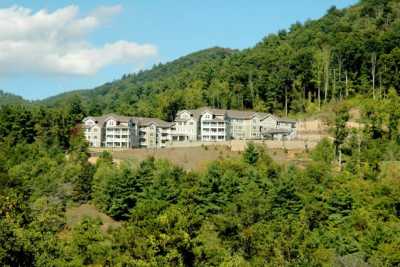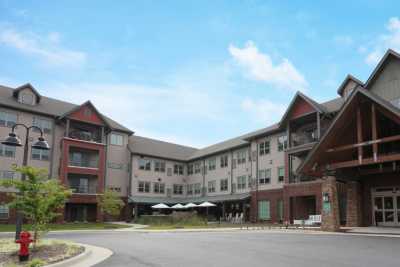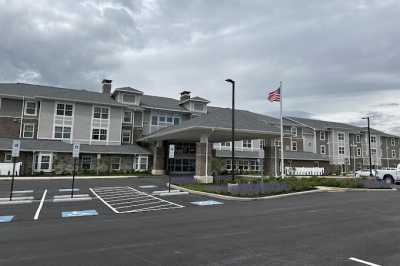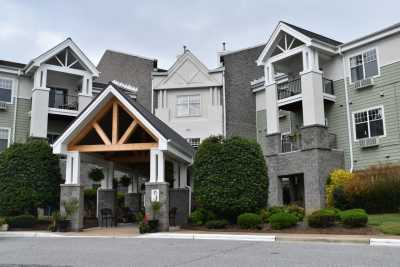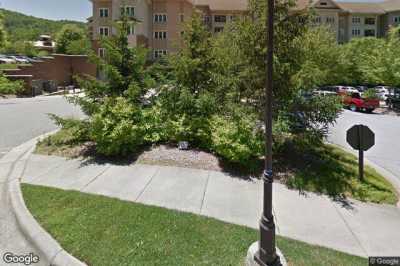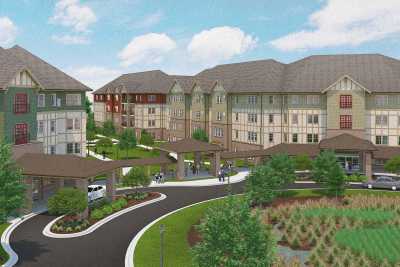
10 Best Independent Living Communities in Asheville, NC
Asheville, North Carolina, is home to many seniors looking for the best balance of an exciting, cost-effective, and relaxing lifestyle. Nestled in the heart of the Blue Ridge Mountains, Asheville is known for its thriving artistic community, as well as an abundance of outdoor opportunities, such as walking trails, fishing areas, and other ways to enjoy the beautiful nature surrounding the city and mild climate.
Independent living communities in Asheville offer comfortable living spaces and a range of enjoyable activities, like swimming, fitness classes, and various types of social events and entertainment. Here, seniors can make the most out of their retirement years by remaining independent and active without worrying about home maintenance or safety.
There are a number of independent living communities to choose from, all within 10 miles of downtown Asheville. A Place for Mom collaborates with multiple communities in the Asheville region to assist seniors in finding the perfect match for their preferences and needs.
In this guide, you will gain insights into independent living in Asheville. Topics covered include costs, payment options, and laws and regulations. Let A Place for Mom support you in choosing the ideal community for the next exciting stage of your life.
Asheville Independent Living Facilities | 134 Reviews
I think that I would recommend Bella Vista to others. My mom's biggest complaints are about the food and how long they have to sit for the meals, but she does like all of the activities that they have for...
I liked the place and would have kept her there but she said she didn't like it. There were always activities and she did a lot of walking to stay active. I only worried about her getting enough to drink...
The staff is very caring and work hard to make it a good place to live. I get three meals a day cooked by two chefs that they hired from restaurants down in Asheville that were closed from the storm. People...
I would highly recommend Trinity View Retirement Community to others. They have great staff who are accommodating with everything. The food has not been what my loved one likes. Otherwise, the experience has...
The community is very friendly. My mom enjoys all of the social activities. The food is really good and nicely presented. The only drawback might be that there aren't extensive outdoor walking/ exercise...
Our free advisors can help
- Compare local facilities
- Determine care type
- Schedule tours
- Evaluate pricing
Our methodology
How we rank order the Asheville community options above
We developed a proprietary recommendation system that orders Asheville community options based on factors we know are important to seniors and their families:
- Proximity to your search location
- Availability of recent, high-quality reviews
- The amount of detailed community information available
Where we source our information
14,000+ communities
We collect proprietary data from our network of 14,000+ senior living communities in the U.S., with regular refreshes of data and information
350,000+ reviews
We have 387,000+ reviews from senior living residents and family members that provide first-hand accounts about senior living communities
- Costs of independent living in the Asheville area
- What families are saying about independent living in Asheville
- How people pay for independent living in Asheville
- Understand North Carolina laws and regulations for independent living communities
- Independent living in Asheville
- Asheville independent living services and amenities
- Explore senior care with confidence
- Unfamiliar with Asheville? Highlights for seniors
Costs of independent living in the Asheville area
The average monthly cost for Asheville independent living facilities is $4,873.{{citation: 1}} This number is based on A Place for Mom’s proprietary data, which reflects actual expenses paid by residents at our network facilities. It takes into account a variety of floor plans and amenities, as well as any additional fees, entrance fees, or other costs.
The following information represents the average baseline costs of independent living facilities in Asheville, not accounting for add-on fees.
Average monthly cost of Independent Living in Asheville, NC vs. nearby cities
Average monthly cost of Independent Living in Asheville, NC vs. the state and national average
Average monthly cost of Independent Living in Asheville vs. other types of senior living
Median monthly costs of Independent Living in Asheville, NC by room type
What families are saying about independent living in Asheville
Recent reviews for independent living in Asheville
Pacifica Senior Living Heritage Hills in Hendersonville, NC
College Walk Retirement Ctr in Brevard, NC
Marjorie McCune Memorial Center in Black Mountain, NC
How people pay for independent living in Asheville
Independent living communities in Asheville are designed to provide general housing for seniors rather than the specialized care typically found at assisted living or memory care facilities. As a result, long-term health insurance, Medicaid, and Medicare do not cover the expenses associated with independent living, and residents often rely on personal, private funds to cover these costs.
However, Medicare and Medicaid can provide financial assistance to seniors to help cover the expenses of in-home health care services. Additionally, there are other financial options and benefits available to make independent living more accessible and cost-effective.
The following sections provide resources to help navigate private payment methods, veterans benefits, Medicare, and Medicaid.
Personal funds are the primary payment method for independent living communities in Asheville. This may include income sources such as personal savings, Social Security benefits, pensions, and investment returns. Seniors can also explore the possibility of selling their house and using a reverse mortgage or life insurance policies to offset the cost of independent living.
Number of veterans who live in Asheville{{citation: 2}}
About 52% of Asheville veterans are 65+{{citation: 2}}
Asheville’s strong veteran community is supported by several state, federal, and local organizations that offer resources to help veterans take full advantage of any benefits they may be eligible for.
Veterans in Asheville may qualify for monthly VA Pension payments that can be applied toward anything that improves their lives, including the costs of independent living. The Aid and Attendance benefit, added to VA Pension payments, may also be available to some veterans, providing additional financial support for housing and health care costs.
Enrolling in A&A can be a complicated process, and it’s essential to seek guidance from veterans services offices or advisors to navigate it successfully. The Buncombe County Veterans Services Office, the local Disabled American Veterans (DAV) organization, the North Carolina Department of Military & Veterans Affairs, and the Division of Aging and Adult Services can all offer valuable resources to assist veterans in navigating the process of paying for independent living expenses using their benefits.
Resources for Asheville veterans
Buncombe County Veterans Services Office
40 Coxe Ave.
Asheville, NC 28801
Phone: 828-250-5726
Hours: Monday through Friday, 8 a.m. – 5 p.m.
North Carolina Department of Military & Veterans Affairs
413 N. Salisbury St.
Raleigh, NC 27603
Phone: 844-624-8387
American Legion Posts
103 Reddick Road
Asheville, NC 288805
Phone: 828-299-8463
Hours: Monday through Friday, 8 a.m. – 5 p.m.
851 Haywood Road
Asheville, NC 28806
Phone: 828-505-4729
1329 Tunnel Road
Asheville, NC 28805
Phone: 828-298-7952
Winston-Salem DAV Office
251 N. Main St., Room 151
Winston-Salem, NC 27101
Phone: 336-631-5481
Hours: Monday through Friday, 8 a.m. – 4:30 p.m.
While Medicaid doesn’t cover housing costs for independent living communities, it does provide coverage for medically necessary in-home health care services through Home and Community-Based Services (HCBS) Waiver programs. The North Carolina Medicaid, known as NC Medicaid, offers the Community Alternatives Program for Disabled Adults (CAP/DA) Waiver, NC Innovations Waiver, and the NC Traumatic Brain Injury (TBI) Waiver to help cover costs. This fact sheet on North Carolina Waivers provides valuable information about each program’s benefits that can be used to offset eligible seniors’ independent living costs.
The CAP/DA Waiver program offers an extensive variety of services to support seniors aged 65 and over, as well as individuals with disabilities aged 18 and 64, that require the same level of care as nursing facility residents. Some of the services provided by the program include adult day health, in-home aide, financial management services, personal assistance services, and other services depending on specific needs.
Individuals with intellectual or developmental disabilities who require an ICF/IID level of care can find support with the NC Innovations Waiver. This waiver provides community navigation, day and residential support, respite care, supported employment, assistive technology, crisis services, home modifications, and more.
The NC TBI Waiver program is designed to support individuals ages 18 or older who have sustained a brain injury and require a hospital or nursing facility level of care. This program provides a range of services, including day support, personal care, residential support, respite, supported employment, therapy services, assistive technology, and more. Additionally, the program offers crisis support, community networking, home modifications, and natural support education to help individuals with brain injuries live independently and improve their quality of life.
To start applying for NC Medicaid or to determine eligibility for the waivers discussed here, visit the NC Medicaid page or the application site.
In addition, Buncombe County Health & Human Services, the Council on Aging of Buncombe County, and the NC Medicaid Ombudsman can provide support and resources to help navigate the Medicaid application process — from determining eligibility to finding specific community-based programs and resources based on your specific circumstances.
Asheville resident Medicaid resources
Buncombe County Health & Human Services
40 Coxe Ave.
Asheville, NC 28801
Phone: 828-250-5500
Hours: Monday through Friday, 8 a.m. – 5 p.m.
Council on Aging of Buncombe County
46 Sheffield Circle
Asheville, NC 28803
Phone: 828-277-8288
Email: info@COAbc.org
Hours: Monday through Friday, 9 a.m. – 4:30 p.m.
NC Medicaid Ombudsman
Email: info@ncmedicaidombudsman.org
Phone: 877-201-3750
Medicare doesn’t cover the cost of an independent living facility, but it can help with short-term medical needs for seniors who require in-home care. Fortunately, there are several programs available to ensure Asheville seniors have access to the care they need.
- Medicare Savings Program (MSP): Helps pay for premiums for Medicare enrollees. A helpful guide with information on North Carolina’s MSP is available.
- NC Medication Assistance Program (MAP): Provides low-cost medications through participating clinics and health centers.
- NC Medicare and Seniors’ Health Insurance Information Program (SHIIP): Offers free counseling and assistance to help seniors understand their plan options, apply for programs, and manage Medicare costs.
- Program of All-Inclusive Care for the Elderly (PACE): PACE provides comprehensive medical care for eligible seniors in Buncombe or Henderson County, including primary care, hospital care, prescription drugs, and home care services. PACE also offers community-based care as an alternative to nursing home-level care.
For help with Medicare enrollment and eligibility requirements, start by contacting the Social Security Administration office or visiting their online Medicare application site. The local ombudsman and office of Aging and Adult Services can also provide information and answer questions about Medicare benefits and coverage options specific to Asheville and North Carolina.
Asheville resident Medicare resources
Social Security Administration Office
800 Centrepark Drive
Asheville, NC 28805
Phone: 800-772-1213
Hours: Monday through Friday, 9 a.m. – 4 p.m.
Aging and Adult Services
Contact: Joyce Massey-Smith
Phone: 919-855-3400
Long-Term Care Ombudsman Program
Contact: Victor Orija, state long-term care ombudsman
Email: victor.orija@dhhs.nc.gov
Phone: 919-855-3426
Contact: Renee Kea, ombudsman/elder rights specialist
Email: renee.kea@dhhs.nc.gov
Phone: 919-855-3431
Contact: Kendra Dixon, ombudsman program specialist
Email: lakendra.dixon@dhhs.nc.gov
Phone: 919-855-3433
Understand North Carolina laws and regulations for independent living communities
Because standalone independent living communities in Asheville are considered private residential arrangements meant to house healthy, independent adults, the state of North Carolina does not license or regulate them.
There are some general guidelines that standalone independent living communities in Asheville must follow, such as age requirements (55 and up) and rental and housing laws, including:
- Fair Housing Act: Prohibits discrimination on the basis of race, color, religion, sex, national origin, familial status, and disability.
- Americans with Disabilities Act: Requires communities to meet certain accessibility requirements, such as having wheelchair ramps, handrails, and other features to accommodate residents with disabilities.
- North Carolina landlord-tenant laws: Requires independent living communities to comply with provisions regarding leases, security deposits, and eviction procedures.
Independent living communities in Asheville must also comply with health and safety regulations and disclosure requirements. Health and safety regulations require buildings to be up to code, common areas to be well-maintained, and emergency plans to be in place, while disclosure requirements ensure prospective residents receive certain disclosures about fees, services, and amenities.
Asheville independent living communities are subject to random inspections to ensure compliance with state regulations and housing codes. The City of Asheville Inspections Department is responsible for conducting these inspections, which include obtaining an occupancy permit before tenants can move in to verify that the property meets health, safety, and building standards. If tenants believe that there are any code violations or safety hazards, they can request inspections.
Permit information can be found on the City of Asheville website, and the Development Services Department can be contacted for specific inspection reports.
Regulations for combination independent living and assisted living facilities
Independent living communities that provide assisted living or memory care services are subject to various regulations to ensure that they provide safe, accessible, and comfortable living environments for residents. Some of our partners offer such care, so it’s important to understand the laws and regulations governing them.
For example, these Adult Care Homes, or assisted living residences in which 24-hour personal care services are provided to two or more residents, must be licensed by the North Carolina Division of Health Service Regulation (DHSR), which sets standards for the staffing and services provided. The DHSR also performs yearly inspections to ensure those standards are being met in each facility. The DHSR website has a search function so people can easily find inspection reports.
At a minimum, assisted living facilities in North Carolina must have one staff member awake at all times to provide for residents’ needs. In addition, staff members must be trained in resident care, medication management, emergency procedures, effective communication, and more. These facilities are permitted to provide some health care, but not to the level of skilled nursing care.
To become a resident, a person must need assistance with daily living activities, such as bathing and dressing. Each resident is required to receive an individualized care plan to address their needs related to safety, health, daily activities, socialization, and more.
North Carolina Department of Health contact information
NC Department of Health and Human Services
2001 Mail Service Center
Raleigh, NC 27699
Phone: 800-662-7030
COVID-19 regulations for Asheville independent living communities
Asheville, North Carolina has adapted to the ongoing COVID-19 pandemic by following guidance provided by the CDC and the state of North Carolina. Although there are no specific regulations for independent living facilities to follow in relation to COVID-19 in Asheville, the state regularly provides information and resources related to the pandemic.
The Buncombe County website also provides helpful answers to common questions related to the pandemic, including information about COVID-19 testing sites, vaccination clinics, and health guidelines.

Vaccinations.
Getting fully vaccinated is strongly encouraged for all North Carolina residents. Those who are not vaccinated are advised to wear masks and maintain a distance of six feet from others as a precautionary measure.
Independent living in Asheville
Asheville offers a range of independent living communities for seniors, each with its own unique charm and amenities. This section provides a glimpse into Asheville life, highlighting not only unique features for independent living communities but also what it’s like to live in the area.
Amenities in Asheville’s independent living communities
Asheville’s independent living communities offer a wide variety of amenities to cater to the needs and preferences of its residents. Beyond the basic features of a safe and comfortable living environment, these communities go the extra mile to enhance residents’ quality of life. Many communities feature shared spaces like recreation centers, fitness centers, and swimming pools where residents can socialize, exercise, and relax. These amenities not only promote physical wellness but also create opportunities for residents to connect with one another and foster a sense of community. In addition, many independent living communities host community events, such as excursions to museums, cultural events, and more.
Meals and more
Most of our partner independent living communities offer meal programs and full-service dining rooms, providing residents with food options without having to leave the premises. This convenience can be especially valuable for seniors who may have mobility or transportation challenges. However, many communities also offer transportation services, taking residents to and from any outings including meals, appointments, social events, and errands. This can provide peace of mind for residents and their families, ensuring they can safely and conveniently get where they need to go.
Living close to nature
One of the highlights of independent living communities in Asheville is their proximity to nature. The Blue Ridge Mountains provide a breathtaking backdrop for outdoor recreational activities such as hiking, biking, and fishing. Seniors can also enjoy the area’s numerous parks, gardens, and nature reserves, which are perfect for a relaxing afternoon stroll.
A number of our partner independent living communities have nature trails right on the property for residents to explore and frequently take residents on excursions to the mountains and other outdoor areas. Surrounded by trees and fresh mountain air and within close distance to downtown, independent living in Asheville provides the perfect balance for residents who want to experience the great outdoors and vibrant city life.
Asheville independent living services and amenities
Availability of select dietary accommodations in Asheville independent living
Availability of select dining options in Asheville independent living
Availability of select programs and activities in Asheville independent living
Explore senior care with confidence
Know where to start.
Identify the right care for your loved one with our free assessment.

See what you can afford.
Understand cost and payment for long-term care based on your loved one's needs.

Find top facilities for you.
Free, personalized guidance from our Senior Living Advisors can help you narrow your search.

Tour your favorite facilities.
Our free touring checklist can help you choose the right community.
Unfamiliar with Asheville? Highlights for seniors
Number of seniors over the age of 65 currently living in Asheville
Median annual income for Asheville seniors 65 and older
Health care for seniors in Asheville

Mission Hospital
Mission Hospital is widely recognized as a top-tier Level II Trauma center and is renowned for its expertise in performing complex procedures. With its focus on orthopedic trauma care, it is the sole trauma hospital serving the western region of North Carolina.{{citation: 3}}

UNC Health-Pardee
UNC Health-Pardee is renowned for its Level I Trauma Center and its exceptional health care services. Among its specialties are comprehensive treatments for COPD and GI-related conditions, as well as in-patient care for substance abuse disorders.{{citation: 4}}

Charles George Department of Veterans Affairs Medical Center
Charles George VA Hospital provides comprehensive care and general surgical services for patients. As a Veterans Affairs hospital, the facility is dedicated to serving the health care needs of veterans who have served in the armed forces.
Transportation for seniors in Asheville
Asheville’s downtown area is pedestrian-friendly, and walking is the best way to explore the heart of the city. However, if seniors plan on venturing outside of downtown or to access the surrounding outdoor activities, having a car is necessary. While 100% of A Place for Mom’s independent living partners offer complimentary transportation and 50% offer at-cost transportation if you are exploring farther than their typical range, Asheville has plenty of public transportation options that seniors should still be aware of.
For seniors who need to utilize public transportation, Asheville Rides Transit (ART) bus services offer a free monthly bus pass for individuals aged 65 and older through Mountain Mobility. This service provides flexible travel options without the need for reservations. Seniors can also take advantage of the RIDE voucher program, which offers transportation services to elderly and disabled residents at a discounted rate.
To gauge the ease of getting around the city on foot, bike, or public transportation, Asheville’s walkability and public transportation scores can be helpful. These scores, which range from 0 to 100, are determined by the city’s transportation system, density, biking infrastructure, and walking routes.{{citation: 5}}

Walk Score

Transit Score

Bike Score
Senior activities in Asheville
Asheville is a thriving city that caters to the diverse interests of its senior population. Whether residents prefer to stay active outdoors or simply relax and socialize with friends, Asheville has a variety of activities to suit every interest and lifestyle.
Asheville’s breathtaking natural beauty makes it an ideal destination for nature enthusiasts. The city’s location in the Blue Ridge Mountains and close proximity to the Smoky Mountains offers stunning mountain views, miles of hiking trails, and a variety of outdoor recreational activities.
Seniors can continue to explore the outdoors and stay active by joining the Green Thumb Garden Club or the Senior Hike Trail Club. Additionally, birdwatchers can join the Story Trail Bird Watching Club to discover and identify different species of birds in the area.
Asheville’s charm is not limited to the outdoors, though. The Folk Art Center and Lexington Glassworks offer a diverse collection of contemporary and modern art exhibitions, as well as art classes for seniors looking to explore their creative side. For those interested in history, the Carl Sandburg Home and Hendersonville Brewery Tour provide glimpses into the history and culture of the city.
Asheville’s many restaurants, cafes, and breweries offer opportunities for seniors to socialize and enjoy the local culinary scene. Whether it’s a coffee date with friends, a wine tasting, or a food tour, seniors can take advantage of everything Asheville’s food and drink culture has to offer.
Senior and community centers also provide a wide variety of engaging activities that seniors of all interests can find appealing. From art classes and bridge tournaments to woodworking and sports leagues, there is something for everyone. Explore some of Asheville’s popular senior and community centers below:
- Burton Street Community Center
- Dr. Wesley Grant Sr. Southside Center
- Grove Street Community Center
- Harvest House Community Center
- Linwood Crump Shiloh Community Center
- Murphy-Oakley Community Center
- Stephens-Lee Community Center
- Tempie Avery Montford Community Center
Asheville is the perfect destination for seniors looking to explore and stay active, no matter their interests! The city offers a wide variety of attractions that can be tailored to suit any individual and many activities are accessible for those with disabilities. Just get in touch with each location before you plan to visit so they can accommodate accordingly.
Frequently Asked Questions
Pacifica Senior Living Heritage Hills, Bella Vista and Julian Woods Retirement are the top-rated Independent Living facilities near Asheville, NC. These Independent Living facilities received the highest rankings based on verified family reviews. See full list of communities.
The average cost of Independent Living in Asheville is $3,566 per month. This cost may vary based on location, amenities, floorplan, level of care and other factors.
References
A Place for Mom. (2023). A Place for Mom proprietary data.
United States Census Bureau. (2021). Veteran Status (S2101) [Data set]. American Community Survey.
U.S. News and World Report. (2023). Mission Hospital-Asheville.
Healthgrades (2023). Pardee Hospital.
Walk Score. (2023). Asheville, NC.

More questions?
Ask an A Place for Mom local advisor at no cost.
- Hendersonville, North Carolina
- Black Mountain, North Carolina
- Brevard, North Carolina
- Weaverville, North Carolina
- Lake Lure, North Carolina
- Mills River, North Carolina
- Flat Rock, North Carolina
- Candler, North Carolina
- Arden, North Carolina
- Fletcher, North Carolina
- East Flat Rock, North Carolina
- Etowah, North Carolina
- Waverly, North Carolina
- Montreat, North Carolina
- Blue Ridge, North Carolina
- Leicester, North Carolina
- Mountain Home, North Carolina
- Canton, North Carolina
- Craggy, North Carolina
- Woodfin, North Carolina


